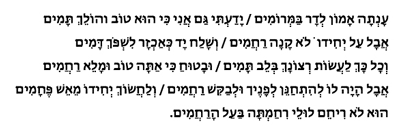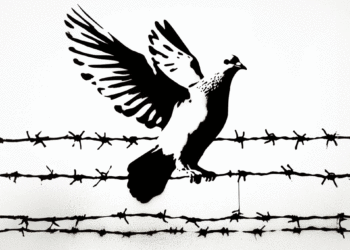The binding of Isaac, seen as part of the core of Judaism, may not be the best example of what is good or right
By MOSHE GIT
Rabbi Shimon Hurwitz of Aish Hatorah yeshiva asserts that “Torah teaches morality.” Thus, according to him, the study of Torah is vital to education; it would save those who study Torah from becoming “a menace to society” (“Who will fight for Israel?” 2-3-12 AJW).
Does Torah teach morality?
We will neither try here to define “morality,” nor what “good” or “right” morality or “bad” or “wrong” morality is. These terms are very subjective (e.g., the Spartans exposed their babies to the elements for a few days. Only the strongest survived. One may assume that they considered this conduct morally right). We will assume the more intuitive definitions.
Despite the familiar overview of the Torah: “Her ways are pleasant ways and all her paths are peaceful” (Proverbs 3:17), there are numerous occurrences and directives in the Torah that are laden with blood and gore.
We can cite here the example of the execution of the Jew who collected pieces of wood on the Sabbath, the sacrificing of Yiftah’s daughter by her father, or the various orders to kill women and children of other nations indiscriminately. But we will dwell on one particular example that is believed to be an integral part of the core of Judaism. It is the story of the binding of Isaac (Akeidat Yitzchak).
Many of us learned of the Akeida event early in our childhood. Our teachers typically hailed Abraham for what he did, since it demonstrated his absolute and unwavering obedience to God. As with things that leave their imprint on us during childhood, many of us have taken it for granted that the Akeida event was entirely positive and have never stopped to question it.
But if you forget what you have learned and look at the story in an unbiased way, you might be shocked by the cruelty that reigns here. God, whom we expect to be merciful, directs Abraham to slaughter his son. Abraham, without even attempting to question God’s dictate and plead for his son’s life — unlike his reaction when God destroyed the city of Sodom — proceeds to follow God’s instruction.
Imagine if this were to take place today. A child protection agency would remove Isaac from his family and place him in foster care. Yossi Sarid, Israel’s former education minister, tells that in second grade, after he learned of the Akeida, he became terrified whenever his father approached him — afraid that his father would grab him and take him off to be slaughtered. It took him a while to get over this trauma.
Throughout the ages, the Akeida’s immorality reverberated in the minds of a few. In the seventh century, the Paytan Yochanan Hacohen (a paytan is a person who writes pi’utim — poems that were incorporated into the prayer books) composed a pi’ut about the giving of the Torah, to be recited on Shavuot service before the Kedusha.
This pi’ut (called “Then, before earth and heaven were established”) displays in the following stanza a dialogue between the Torah and God, in which the Torah explains why she refused to be given to Abraham, but rather to Moses:

The Torah came to G-d to say:
I, too, know he follows the righteous way,
But for his son, no compassion was shown
And he was ready to shed blood of his very own
He was so willing to fulfill what You wished him to do
That he left the task of compassion to you.
But he should have pleaded for one so dear
And saved his son from fire and fear.
There would have been no mercy on its way
had You, Master of Compassion, mercy failed to display.
Basically, the pi’ut chides Abraham for his cruelty in going forward blindly with the plan to slaughter his son, without even attempting to plead for God’s mercy.
Our Torah commentators suggest that Sarah, Abraham’s wife, died when she heard of her son being taken to be slaughtered; but, generally, the commentators stopped there, failing to garner courage to attribute fault to Abraham. Rather, on the contrary, Abraham’s conduct is traditionally presented as the epitome of Judaism, a pattern to emulate.
The modern Jewish theologian Yeshayahu Leibowitz resolves the dichotomy by rejecting outright the attempts to link Torah and morality. His views on this matter are worthy of another article.
***
Moshe Git lives in Minnetonka.
(American Jewish World, 3.30.12)



















